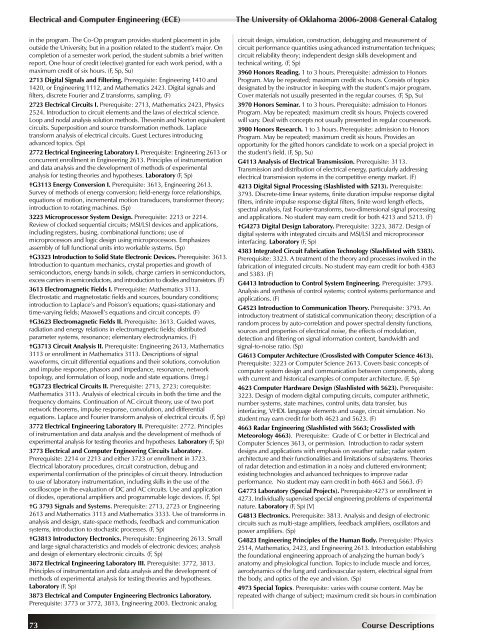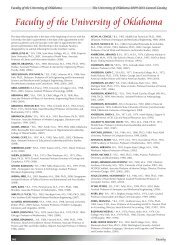ART - Catalog - University of Oklahoma
ART - Catalog - University of Oklahoma
ART - Catalog - University of Oklahoma
Create successful ePaper yourself
Turn your PDF publications into a flip-book with our unique Google optimized e-Paper software.
Electrical and Computer Engineering (ECE)<br />
The Uni ver sity <strong>of</strong> <strong>Oklahoma</strong> 2006-2008 Gen eral Cat a log<br />
in the program. The Co-Op program provides student placement in jobs<br />
outside the <strong>University</strong>, but in a position related to the student’s major. On<br />
completion <strong>of</strong> a semester work period, the student submits a brief written<br />
report. One hour <strong>of</strong> credit (elective) granted for each work period, with a<br />
maximum credit <strong>of</strong> six hours. (F, Sp, Su)<br />
2713 Digital Signals and Filtering. Prerequisite: Engineering 1410 and<br />
1420, or Engineering 1112, and Mathematics 2423. Digital signals and<br />
filters, discrete Fourier and Z transforms, sampling. (F)<br />
2723 Electrical Circuits I. Prerequisite: 2713, Mathematics 2423, Physics<br />
2524. Introduction to circuit elements and the laws <strong>of</strong> electrical science.<br />
Loop and nodal analysis solution methods. Thevenin and Norton equivalent<br />
circuits. Superposition and source transformation methods. Laplace<br />
transform analysis <strong>of</strong> electrical circuits. Guest Lectures introducing<br />
advanced topics. (Sp)<br />
2772 Electrical Engineering Laboratory I. Prerequisite: Engineering 2613 or<br />
concurrent enrollment in Engineering 2613. Principles <strong>of</strong> instrumentation<br />
and data analysis and the development <strong>of</strong> methods <strong>of</strong> experimental<br />
analysis for testing theories and hypotheses. Laboratory (F, Sp)<br />
†G3113 Energy Conversion I. Prerequisite: 3613, Engineering 2613.<br />
Survey <strong>of</strong> methods <strong>of</strong> energy conversion; field-energy force relationships,<br />
equations <strong>of</strong> motion, incremental motion transducers, transformer theory;<br />
introduction to rotating machines. (Sp)<br />
3223 Microprocessor System Design. Prerequisite: 2213 or 2214.<br />
Review <strong>of</strong> clocked sequential circuits; MSI/LSI devices and applications,<br />
including registers, busing, combinational functions; use <strong>of</strong><br />
microprocessors and logic design using microprocessors. Emphasizes<br />
assembly <strong>of</strong> full functional units into workable systems. (Sp)<br />
†G3323 Introduction to Solid State Electronic Devices. Prerequisite: 3613.<br />
Introduction to quantum mechanics, crystal properties and growth <strong>of</strong><br />
semiconductors, energy bands in solids, charge carriers in semiconductors,<br />
excess carriers in semiconductors, and introduction to diodes and transistors. (F)<br />
3613 Electromagnetic Fields I. Prerequisite: Mathematics 3113.<br />
Electrostatic and magnetostatic fields and sources, boundary conditions;<br />
introduction to Laplace’s and Poisson’s equations; quasi-stationary and<br />
time-varying fields; Maxwell’s equations and circuit concepts. (F)<br />
†G3623 Electromagnetic Fields II. Prerequisite: 3613. Guided waves,<br />
radiation and energy relations in electromagnetic fields; distributed<br />
parameter systems, resonance; elementary electrodynamics. (F)<br />
†G3713 Circuit Analysis II. Prerequisite: Engineering 2613, Mathematics<br />
3113 or enrollment in Mathematics 3113. Descriptions <strong>of</strong> signal<br />
waveforms, circuit differential equations and their solutions, convolution<br />
and impulse response, phasors and impedance, resonance, network<br />
topology, and formulation <strong>of</strong> loop, node and state equations. (Irreg.)<br />
†G3723 Electrical Circuits II. Prerequisite: 2713, 2723; corequisite:<br />
Mathematics 3113. Analysis <strong>of</strong> electrical circuits in both the time and the<br />
frequency domains. Continuation <strong>of</strong> AC circuit theory, use <strong>of</strong> two port<br />
network theorems, impulse response, convolution, and differential<br />
equations. Laplace and Fourier transform analysis <strong>of</strong> electrical circuits. (F, Sp)<br />
3772 Electrical Engineering Laboratory II. Prerequisite: 2772. Principles<br />
<strong>of</strong> instrumentation and data analysis and the development <strong>of</strong> methods <strong>of</strong><br />
experimental analysis for testing theories and hypotheses. Laboratory (F, Sp)<br />
3773 Electrical and Computer Engineering Circuits Laboratory.<br />
Prerequisite: 2214 or 2213 and either 3723 or enrollment in 3723.<br />
Electrical laboratory procedures, circuit construction, debug and<br />
experimental confirmation <strong>of</strong> the principles <strong>of</strong> circuit theory. Introduction<br />
to use <strong>of</strong> laboratory instrumentation, including skills in the use <strong>of</strong> the<br />
oscilloscope in the evaluation <strong>of</strong> DC and AC circuits. Use and application<br />
<strong>of</strong> diodes, operational amplifiers and programmable logic devices. (F, Sp)<br />
†G 3793 Signals and Systems. Prerequisite: 2713, 2723 or Engineering<br />
2613 and Mathematics 3113 and Mathematics 3333. Use <strong>of</strong> transforms in<br />
analysis and design, state-space methods, feedback and communication<br />
systems, introduction to stochastic processes. (F, Sp)<br />
†G3813 Introductory Electronics. Prerequisite: Engineering 2613. Small<br />
and large signal characteristics and models <strong>of</strong> electronic devices; analysis<br />
and design <strong>of</strong> elementary electronic circuits. (F, Sp)<br />
3872 Electrical Engineering Laboratory III. Prerequisite: 3772, 3813.<br />
Principles <strong>of</strong> instrumentation and data analysis and the development <strong>of</strong><br />
methods <strong>of</strong> experimental analysis for testing theories and hypotheses.<br />
Laboratory (F, Sp)<br />
3873 Electrical and Computer Engineering Electronics Laboratory.<br />
Prerequisite: 3773 or 3772, 3813, Engineering 2003. Electronic analog<br />
circuit design, simulation, construction, debugging and measurement <strong>of</strong><br />
circuit performance quantities using advanced instrumentation techniques;<br />
circuit reliability theory; independent design skills development and<br />
technical writing. (F, Sp)<br />
3960 Honors Reading. 1 to 3 hours. Prerequisite: admission to Honors<br />
Program. May be repeated; maximum credit six hours. Consists <strong>of</strong> topics<br />
designated by the instructor in keeping with the student’s major program.<br />
Cover materials not usually presented in the regular courses. (F, Sp, Su)<br />
3970 Honors Seminar. 1 to 3 hours. Prerequisite: admission to Honors<br />
Program. May be repeated; maximum credit six hours. Projects covered<br />
will vary. Deal with concepts not usually presented in regular coursework.<br />
3980 Honors Research. 1 to 3 hours. Prerequisite: admission to Honors<br />
Program. May be repeated; maximum credit six hours. Provides an<br />
opportunity for the gifted honors candidate to work on a special project in<br />
the student’s field. (F, Sp, Su)<br />
G4113 Analysis <strong>of</strong> Electrical Transmission. Prerequisite: 3113.<br />
Transmission and distribution <strong>of</strong> electrical energy, particularly addressing<br />
electrical transmission systems in the competitive energy market. (F)<br />
4213 Digital Signal Processing (Slashlisted with 5213). Prerequisite:<br />
3793. Discrete-time linear systems, finite duration impulse response digital<br />
filters, infinite impulse response digital filters, finite word length effects,<br />
spectral analysis, fast Fourier-transforms, two-dimensional signal processing<br />
and applications. No student may earn credit for both 4213 and 5213. (F)<br />
†G4273 Digital Design Laboratory. Prerequisite: 3223, 3872. Design <strong>of</strong><br />
digital systems with integrated circuits and MSI/LSI and microprocessor<br />
interfacing. Laboratory (F, Sp)<br />
4383 Integrated Circuit Fabrication Technology (Slashlisted with 5383).<br />
Prerequisite: 3323. A treatment <strong>of</strong> the theory and processes involved in the<br />
fabrication <strong>of</strong> integrated circuits. No student may earn credit for both 4383<br />
and 5383. (F)<br />
G4413 Introduction to Control System Engineering. Prerequisite: 3793.<br />
Analysis and synthesis <strong>of</strong> control systems; control systems performance and<br />
applications. (F)<br />
G4523 Introduction to Communication Theory. Prerequisite: 3793. An<br />
introductory treatment <strong>of</strong> statistical communication theory; description <strong>of</strong> a<br />
random process by auto-correlation and power spectral density functions,<br />
sources and properties <strong>of</strong> electrical noise, the effects <strong>of</strong> modulation,<br />
detection and filtering on signal information content, bandwidth and<br />
signal-to-noise ratio. (Sp)<br />
G4613 Computer Architecture (Crosslisted with Computer Science 4613).<br />
Prerequisite: 3223 or Computer Science 2613. Covers basic concepts <strong>of</strong><br />
computer system design and communication between components, along<br />
with current and historical examples <strong>of</strong> computer architecture. (F, Sp)<br />
4623 Computer Hardware Design (Slashlisted with 5623). Prerequisite:<br />
3223. Design <strong>of</strong> modern digital computing circuits, computer arithmetic,<br />
number systems, state machines, control units, data transfer, bus<br />
interfacing, VHDL language elements and usage, circuit simulation. No<br />
student may earn credit for both 4623 and 5623. (F)<br />
4663 Radar Engineering (Slashlisted with 5663; Crosslisted with<br />
Meteorology 4663). Prerequisite: Grade <strong>of</strong> C or better in Electrical and<br />
Computer Sciences 3613, or permission. Introduction to radar system<br />
designs and applications with emphasis on weather radar; radar system<br />
architecture and their functionalities and limitations <strong>of</strong> subsystems. Theories<br />
<strong>of</strong> radar detection and estimation in a noisy and cluttered environment;<br />
existing technologies and advanced techniques to improve radar<br />
performance. No student may earn credit in both 4663 and 5663. (F)<br />
G4773 Laboratory (Special Projects). Prerequisite:4273 or enrollment in<br />
4273. Individually supervised special engineering problems <strong>of</strong> experimental<br />
nature. Laboratory (F, Sp) [V]<br />
G4813 Electronics. Prerequisite: 3813. Analysis and design <strong>of</strong> electronic<br />
circuits such as multi-stage amplifiers, feedback amplifiers, oscillators and<br />
power amplifiers. (Sp)<br />
G4823 Engineering Principles <strong>of</strong> the Human Body. Prerequisite: Physics<br />
2514, Mathematics, 2423, and Engineering 2613. Introduction establishing<br />
the foundational engineering approach <strong>of</strong> analyzing the human body’s<br />
anatomy and physiological function. Topics to include muscle and forces,<br />
aerodynamics <strong>of</strong> the lung and cardiovascular system, electrical signal from<br />
the body, and optics <strong>of</strong> the eye and vision. (Sp)<br />
4973 Special Topics. Prerequisite: varies with course content. May be<br />
repeated with change <strong>of</strong> subject; maximum credit six hours in combination<br />
73 Course Descriptions








